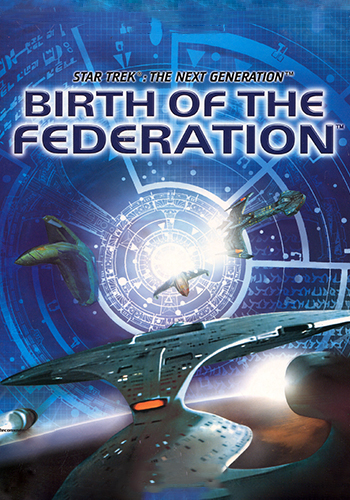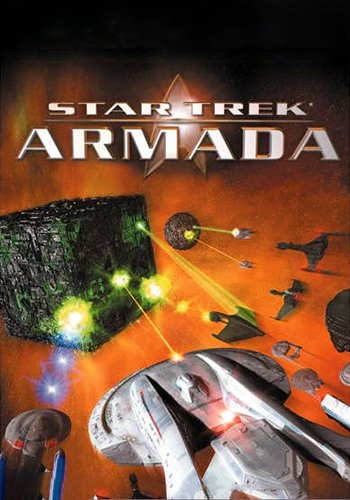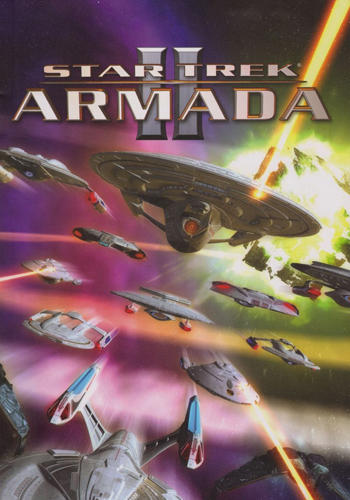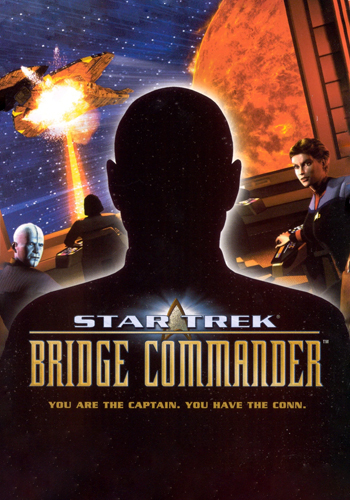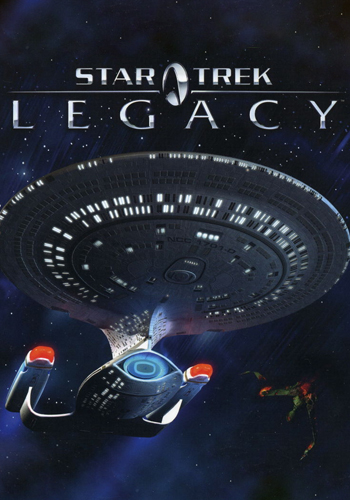Star Trek: New Worlds
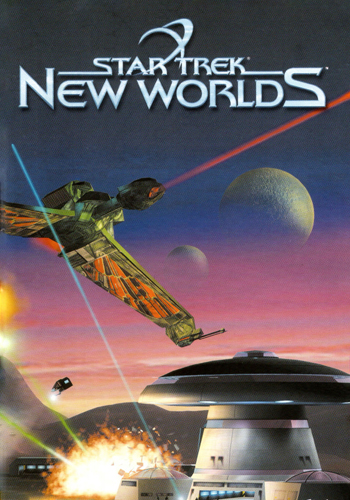
Year: 2000
Type: Gamerip
Composer(s): Julian Soule; Inon Zur
Number of tracks: 15
Beautiful new worlds
It took a long time, but here it is. The first music review for a Star Trek-game. And while not even most Trekkies will know New Worlds , for me it has one of the best scores in the video game franchise. There may be some nostalgia here on my part, as I really enjoyed playing this filthy game back in the day. And it was a dirty game, a kind of Soulslike before Soulslikes existed - and as a real-time strategy game.
The reason for this was the simple fact that the game only saved your progress in the campaign, but you couldn't save within the individual missions. A bad combination for a young gaming kid without much strategy experience in a game that involved relatively extensive resource and micro-management, complex mission objectives and a hideously confusing HUD. Coupled with a mother who strictly observed computer times, a brother who also wanted to use the PC and the not entirely clean programming, which frequently led to crashes, each of the one to two hour long missions became a race against time.
Although the actual idea was quite cool: something went wrong with a Romulan experiment and suddenly numerous new planets appear, which they, the Klingons and of course the Federation want to explore and colonize. Set in the era of Kirk and company, without the Khitomer Accords and with the mysterious Romulans as the obvious villains, there was plenty of fertile ground for exciting missions on the planet's surface - an unprecedented and, unfortunately, unique theme in Star Trek games to date. Star Trek-Games.
Be that as it may, it's probably better in retrospect that there was never a sequel; after all, sites like Metacritic clearly indicate that New Worlds never reached the level of excellence that I would assign to it. Nevertheless, I remain convinced that I would like to see more (strategy) games in the Star Trek cosmos. Armada, Bridge Commander, Starfleet Commander, Elite Force ... such a great IP, so little used. And that this is a shame is shown not least by my Top 10 Sci-Fi Scores, in which the franchise about Picard, Spock and people dressed up as aliens in rubber suits is only beaten by Mass Effect!
The reason for this is not least the music for New Worlds, which was composed by Julian Soule (not his brother Jeremy Soule) and Inon Zur and which actually comes off best with an average rating of 4.5 stars for 15 tracks. The tracks on the Gamerip can be divided into two categories. The Encounter-tracks, which are played during combat, and the Start-tracks, which are the ambient background music. In addition, there are 3 Various-tracks, in which sound snippets and stingers from the individual factions have been compiled ... but I don't want to annoy you here with technical babble.
The individual pieces are pleasantly different from one another without seeming disjointed. For the most part, the composers not only succeed in giving the individual factions and locations their own character, but also remain true to the style of the films. Wind instruments, for example, appear again and again as driving elements that often provide the defining timbres on the screen and in the series.
All the tracks follow a certain structure: a gentle introduction, a strong middle, a leisurely fade-out. This makes it easy for the songs to be looped without being annoying and is certainly due to the fact that this is a game from the beginning of the millennium. As a result, you shouldn't expect any crazy instrumentation, but rather similarities to other scores from the time.
Ecounter (Hubrin), for example, is reminiscent of The Elder Scrolls or games from the Dungeons & Dragons-universe, while Start (Alpine) with its mixture of horns, strings and electric guitars is reminiscent of Sim City 4. And while Start (Ice) and Start (Lava) sound partly like they were borrowed from the SpellForce-series, Start (Mars) brings back memories of Earth 2150. So if there are all these similarities, perhaps I only find the music so cool because it reminds me of other, equally good games?
No!", I can say with a happy heart, because the New Worlds score does something unusual that I also liked in Emergency 2. Zur and Soule use electric guitars in many tracks - not, however, in the Encounter/action tracks, as one might initially assume, but in the ambient tracks. This sounds strange, as the shrill of electrically amplified strings does not necessarily suggest relaxation, but is rather used for pulse-pounding DOOM.
In contrast, the composers use the riffs and scales in New Worlds as accompaniment, as would otherwise be the case for strings, for instance. Take Start (Desert), as an example. As the name suggests, it takes us to sandy climes and makes use of Middle Eastern tropes such as flutes and shallow percussion. The relaxed melody allows the expanse of an oriental steppe to spread out before our mind's eye, while long wind instruments accompany the whole thing - symptomatic of the New Worlds-score.
What would continue in other games as a trivial drone is now supplemented here by the aforementioned electric guitar. While the strings and winds play and swell the melody, they are drowned out by the guitar on the second repetition. Instead of dominating the acoustic image, however, it withdraws before playing the melody and dancing above the action.
This image is continued in the other Start-tracks, where the instrument is sometimes used more, sometimes less. Beyond that, the game's music is also rock solid. With the exception of Encounter (Metar) the encounters sound excellent across the board and capture the character of the respective factions very well according to their originals.
The Federation sounds sublime with its horns and fanfares and, in the spirit of Jerry Goldsmith (Star Trek I, Star Trek V, First Contact, Insurrection, Nemesis), gives an idea of the spirit of the original film. The Klingons seem threatening due to the lower tones, even if none of the familiar motifs are heard here. The same applies to the Romulans, who, due to the lack of a motif, are given their own theme that is somewhere between mysterious, playful and unpredictable.
Overall, with the exception of the Various-tracks, I find the Gamerip entirely recommendable and with an average length of two and a half minutes per track, it's basically like a good album CD that you can listen to in one go. Which you should. I'm just saying ... it's really good!
Nostalgia warning
The rating of the individual tracks is purely subjective and clearly colored by my own experience with the game. You can find out more in the article About Nostalgia.
| No. | Title | Artist(s) | Ratings |
|---|---|---|---|
| 01 | Encounter (Federation) | Julian Soule; Inon Zur | |
| 02 | Encounter (Hubrin) | Julian Soule; Inon Zur | |
| 03 | Encounter (Klingon) | Julian Soule; Inon Zur | |
| 04 | Encounter (Metar) | Julian Soule; Inon Zur | |
| 05 | Encounter (Romulan) | Julian Soule; Inon Zur | |
| 06 | Encounter (Taubat) | Julian Soule; Inon Zur | |
| 07 | Start (Alpine) | Julian Soule; Inon Zur | |
| 08 | Start (Desert) | Julian Soule; Inon Zur | |
| 09 | Start (Ice) | Julian Soule; Inon Zur | |
| 10 | Start (Lava) | Julian Soule; Inon Zur | |
| 11 | Start (Mars) | Julian Soule; Inon Zur | |
| 12 | Start (Mountain) | Julian Soule; Inon Zur | |
| 13 | Various (Federation) | Julian Soule; Inon Zur | |
| 14 | Various (Klingon) | Julian Soule; Inon Zur | |
| 15 | Various (Romulan) | Julian Soule; Inon Zur |



